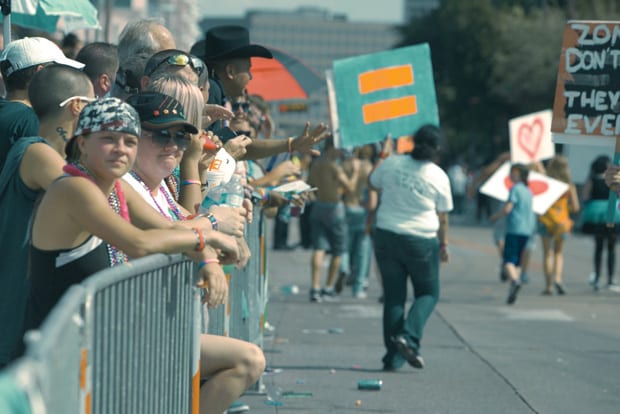This weekend is a time to reflect on how far we’ve come, but also an opportunity to think about what we can do to move equality forward

MARCHING TOWARD EQUALITY | Since 2010, local government entities have added LGBT-inclusive nondiscrimination policies covering 41,000 employees. Dallas County and Dallas Area Rapid Transit are currently considering adding domestic partner benefits. (Chuck Dube/Dallas Voice)
 This weekend marks a personal anniversary. Twenty years ago, I marched in my first Alan Ross Texas Freedom Parade. I remember being overwhelmed by the sights and sounds. Since then,
This weekend marks a personal anniversary. Twenty years ago, I marched in my first Alan Ross Texas Freedom Parade. I remember being overwhelmed by the sights and sounds. Since then,
I’ve either watched the parade or marched in it almost every year.
So much has changed in those ensuing two decades: “don’t ask, don’t tell” was established and subsequently repealed; dozens of cities and other governmental bodies have added workplace protections covering LGBT employees; and an increasing number of states have adopted marriage equality.
At Resource Center Dallas, we’ve focused on fully-inclusive employment nondiscrimination policies, particularly in the government sector. Since the summer of 2010, Resource Center Dallas’ advocacy has helped lead to new or expanded employment nondiscrimination policies covering over 41,000 workers in the Dallas area. And, our work with DISD and the Dallas County Community College District has helped bring fully-inclusive nondiscrimination protections to around 250,000 students.
Two of the center’s current advocacy issues involve another area: domestic partner benefits.
Right now, Dallas County and Dallas Area Rapid Transit (DART) are considering adding domestic partner benefits for their gay and lesbian employees. The county recently ran into a stumbling block to offer the benefits through a shared risk pool involving other local governments. So, officials are working on an alternate plan. They hope county commissioners will vote on that plan in a few weeks. Meanwhile, a DART committee will hear from agency officials next month on what it will take to offer domestic partner benefits there.
In both cases, RCD has been providing information on the benefits and discussing that information with key people. The information has been well received, and I think it will be helpful in both cases as both governmental bodies move toward a decision.
It’s not a case of “can we offer domestic partner benefits?” so much as it is “how much will it cost us to offer these benefits?” That line of thinking, in and of itself, is a sea change. Both entities understand it’s an issue of fairness and equity in the workplace for LGBT employees.
It’s not an issue of money; domestic partner benefits don’t cost much. For example, it cost Parkland Hospital around $21,000 to provide the benefits this year. Only 21 of Parkland’s more than 9,400 employees are taking part in the benefits. It costs the city of El Paso $34,000 to provide domestic partner benefits for 19 of its 6,200 employees, and estimates say it will cost El Paso County about $24,000 to offer the benefits to some of its roughly 7,000 employees.
The Human Rights Campaign estimates the cost of adding domestic partner benefits to a business or governmental agency as being between 1 and 3 percent of the total benefits cost. In this case, business is leading the way, rather than the public sector.
According to the 2012 HRC Corporate Equality Index, nearly nine in 10 Fortune 500 companies offer domestic partner benefits, and nearly six in 10 offer “soft benefits” such as family and bereavement leave.
RCD is hopeful that both Dallas County and DART will adopt domestic partner benefits. But in order to ensure that potential for success, each of us needs to do our part.
Contact the Dallas County Commissioners Court and tell them it’s important to add domestic partner benefits. Write a letter to the DART Board of Directors and say the same thing. Both governmental bodies need to know that these issues are important to the LGBT community, and that as both taxpayers and voters we have a stake in our equality.
There’s one more way you can advocate for your rights and the rights of the greater LGBT community — commit yourself to vote this November. You have about three weeks to register to vote, if you haven’t done so. Once you’re registered, vote absentee or turn up at the polls on Election Day, Nov. 6.
We’re going into a few weeks where LGBT rights will come into increased focus. We will soon know if and/or when the U.S. Supreme Court will take up the appeal on California’s Proposition 8, as well as the status of several cases challenging the Defense of Marriage Act. We’ll also be hearing more and more about the states with marriage equality on the ballots in November.
Polling in several of those states, including Maine and Washington, indicate equality is winning.
Twenty years ago, our North Texas LGBT community was still illegal in the eyes of the law. No one would have dared dream gay and lesbian couples could get married. Yet these and other positive changes are blossoming all around us. This weekend, take a moment to reflect on what we’ve accomplished as a community, and how bright the future can be as we move forward. Happy Dallas Pride!
Rafael McDonnell is communications and advocacy manager, Resource Center Dallas. He can be reached at RMcDonnell@rcdallas.org.
This article appeared in the Dallas Voice print edition September 14, 2012.

